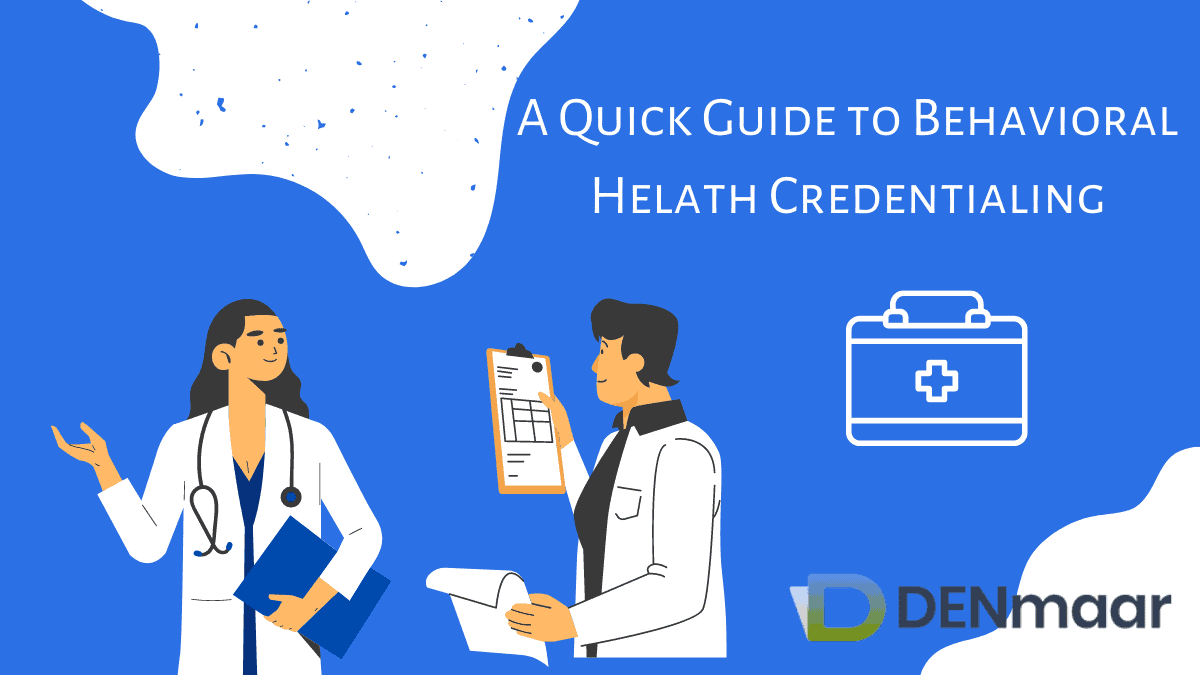
Why Is Medical Credentialing So Important?
Medical credentialing has to be the single most important thing that every healthcare practice and practitioner needs to undertake in the United States. It is a process by which the expertise and qualifications of doctors and nurses are verified. As such, this is one procedure that helps patients trust the healthcare provider of their choice.
Simply verifying a healthcare organization of a practitioner’s credentials isn’t where the merits of the medical credentialing end, though. There is an important financial incentive involved in getting credentialed as well. For instance, most healthcare organizations cannot receive payment for the care offered from insurance companies like Medicare and Medicaid if they do not have medical credentialing.
That being said, we’ve barely scratched the surface trying to explain how fundamental a role medical credentialing plays in the success of healthcare professionals and organizations. There is way more to unpack with medical credentialing when it comes to its benefits. That is what we will try to accomplish today with the help of this article.
We will be looking at all reasons why medical credentialing is vital for hospitals, clinics, and healthcare professionals in general.
But first… let’s take a brief detour to understand how ancient this ostensibly modern practice is.
History of Medical Credentialing
Medical credentialing isn’t a new concept. Instead, it is somewhat of a tradition that has lasted for centuries in a variety of forms. Its origins can be traced all the way back to 1000 BC. The first-ever medical credentialing process took place in ancient Persia, where the cult of Zoroaster demanded a physician treat three heretics. If all three survived their treatment, the physician would be qualified to provide care to patients until the end of their life.
We’ve come a long way since then. The process has evolved to become much more regulated. However, the basic gist of the procedure remains the same – to ensure that a doctor or nurse is qualified to administer treatment to patients.
Reasons Why Credentialing is Important
1. Protecting Patients
As we mentioned, medical credentialing is undertaken to determine whether a practice or healthcare professional is qualified to treat patients. Patient care has always been the core purpose of medical credentialing. The process itself is rather complex and involves verifying a practitioner’s credentials against various relevant data points.
For instance, a practitioner is continuously checked against major publications like Death Master File, Sex Offender Registries, National Abuse Registry, OFAC, and many other sources. A provider can be denied credentialing if their name shows up in any of the above data points. Credentialing can also be denied if a provider’s license has expired or defaulted on their student loans.
Credentialing instills confidence among patients. For example, it would be nice to know that a particular doctor in charge of providing treatment to a child is not a registered sex offender or that a psychologist has the qualifications necessary to provide you with sound advice.
Competency and Performance Reviews are an integral part of the credentialing process. Organizations in charge of this process leave no stone unturned in determining whether a practice or healthcare professionals are worthy of being credentialed. As a result, patients can feel safe going for treatment to clinics and hospitals whose staff are all credentialed.
2. Helps Medical Organizations Prevent Revenue Loss
It is important to note that no insurance company will reimburse a hospital or medical practice if they lack medical credentialing. A medical organization has to first get in-network with insurance carriers like Medicare, Medicaid, etc., to be able to cater to patients with health insurance. A non-credentialed medical organization is not complying with state and federal regulations. This alone can open a can of legal issues (more on this later.)
To put it more succinctly, an insurance carrier will deny reimbursement to a healthcare organization if they hire providers that aren’t credentialed. Furthermore, if a refund has already occurred and it is later revealed that the provider did not possess medical credentialing, they will be hit with fines and civil monetary penalties. Therefore, a healthcare organization must make sure a provider’s credentials are verified upon hire. Not doing so only leaves the practice open to a severe financial hit down the line.
Read More: 5 Things to Learn about Medical Credentialing Process
3. Medical Credentialing Helps Providers Avoid Lawsuits
In a lawsuit, Medical Credentialing has proven to serve as a cover protecting healthcare organizations. For instance, the first thing the law will consider when examining a lawsuit against a healthcare practice is whether or not it complies with state and federal regulations. If a medical practice follows best practices and possesses staff with the necessary accreditations and qualifications, the organization is more likely to imprint a good impression on the Justice System.
On the other hand, if a healthcare organization faces medical negligence and patient endangerment charges, its providers are excluded from medical credentialing. As a result, there is no way to win a lawsuit. Moreover, losing the lawsuit won’t be the worst thing that happens to the practice. The organization’s reputation will be destroyed in the media, leading to serious patient mistrust.
The Bottom Line
Medical credentialing does a lot more than just verifying healthcare professionals’ legitimacy as you learn for yourself. Medical credentialing is such an integral part of our healthcare system today that no healthcare practice can thrive, let alone survive, without undertaking the process.
That being said, the credentialing process isn’t exactly child’s play. It can be complex, time-consuming, and overwhelming to undertake. Fortunately, we at DENmaar take care of the often excruciating credentialing process. Our credentialing specialists ensure you have error-free paperwork ready to help you get in-network with insurance carriers as quickly as possible.
Over the years, we’ve helped many healthcare organizations with their credentialing tasks, thus providing them with more leeway to focus on patient care and other core areas of their practice.
Contact DENmaar now to learn more about the medical credentialing process and how we can help your practice.
Related Posts
5 Credentialing Issues in Healthcare & Their Resolutions
Credentialing issues in healthcare are extremely common. In fact, the process...
Why Is Medical Credentialing So Important?
Medical credentialing has to be the single most important thing that every...
A Quick Guide to Behavioral Health Practitioner Credentialing
The following article will tell everything you need to know about successfully...
5 Essential Things to Learn About the Process of Medical Credentialing
Medical Credentialing can be defined as a process of verifying whether a...



